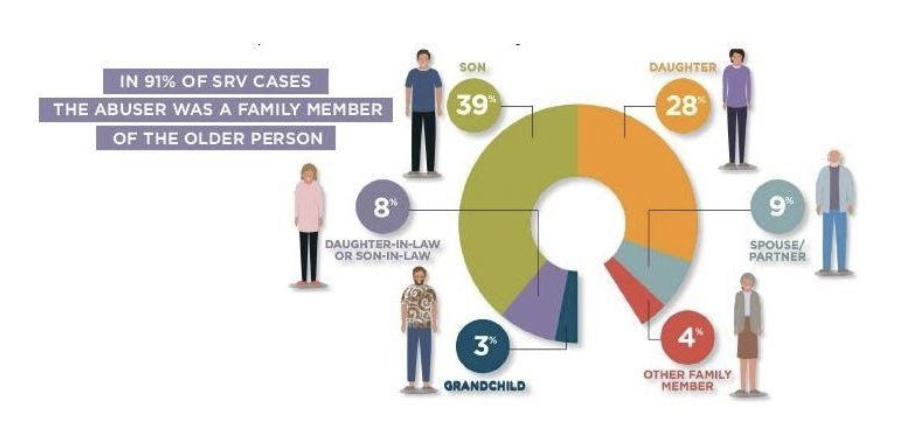
Ninety per cent of elder abuse is perpetrated by family members, according to new data released by Seniors Rights Victoria (SRV) and the National Ageing Research Institute.
Entitled Seven Years of Elder Abuse Data in Victoria, the report analysed 2,385 cases of elder abuse reported to the Seniors Rights Victoria’s confidential helpline between June 2012 and July 2019.
Elder abuse is defined as any act, or failure to act, which causes harm or distress to an older person in a relationship of trust.
“The most common forms of abuse we see are psychological abuse,” Seniors Rights Victoria principal lawyer Rebecca Edwards told ABC Radio Melbourne Mornings.
“So that might be name calling, threats or abuse, and financial abuse.”
For two out of three callers, the perpetrator was an adult son or daughter.
The report found nine out of 10 perpetrators of elder abuse were family members.(Supplied: National Ageing Research Institute In Partnership With Seniors Rights Victoria)
With COVID-19 putting considerable financial and psychological strain on Victorians, there are concerns more people will be turning to their parents for help.
“As people become unemployed they’re returning home, often under a lot of stress,” Ms Edwards said.
“Coupled with increased social isolation, financial pressures and an uncertain future, there is concern they’ll take this out on their parents, who may themselves be isolated from their usual community connections due to COVID-19.”
The report found:
- Seventy-two per cent of callers were older women
- Almost two thirds of callers said they had experienced psychological or financial abuse, while 16 per cent reported physical abuse
- Men are more likely to be perpetrators than women
Family conflict – reported in 44 per cent of all cases – was identified as the most common risk factor.
People experiencing poor physical health, cognitive impairment or a lack of support were identified as being at higher risk of becoming victims.
When someone is experiencing elder abuse they may become noticeably more isolated, anxious or short of money.
“It’s good to see if you can find a time to talk to the older person when the potential perpetrator is not around and just offer them some options,” Ms Edwards said.
“They might not be ready to take any action when you are speaking to them, but at least they know there is support available.”
Psychological and financial abuse were the most commonly reported.(Supplied: National Ageing Research Institute In Partnership With Seniors Rights Victoria)
While adult children are most likely to take advantage of older Victorians, partners, in-laws, grandchildren and friends have also been accused of perpetrating abuse.
The report found drug, alcohol and gambling problems were the highest risk factor for perpetrators, followed by mental health issues and financial difficulties.
A lack of support for carers may also be a contributing factor, particularly where an older person is living with disability or dementia.
SRV hopes this report will encourage further research on elder abuse, as well as better funding for services.
“It’s the sort of thing where, like family violence, it’s been hidden in the past,” Ms Edwards said.
“There is now more and more emphasis on the fact there is help available.”
IF YOU NEED HELP:
- Lifeline on 13 11 14
- Kids Helpline on 1800 551 800
- MensLine Australia on 1300 789 978
- Suicide Call Back Service on 1300 659 467
- Beyond Blue on 1300 22 46 36
- Headspace on 1800 650 890
SheSociety is a site for the women of Australia to share our stories, our experiences, shared learnings and opportunities to connect.

Leave a Reply